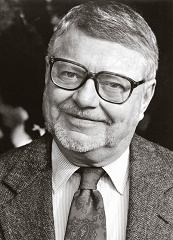
Daniel Heartz
Professor of Music, Emeritus
Professor Emeritus Daniel Heartz, a distinguished and prolific scholar of European music from the sixteenth to the eighteenth centuries, died aged 91 on November 24, 2019 in Berkeley.
Heartz was born in Exeter, New Hampshire on October 5, 1928, and attended the University of New Hampshire as an undergraduate. He received his doctorate from Harvard University in 1957, where his mentors were Otto Gombosi, Tillman Merritt, and John Ward. The distinctive characteristics of Heartz’s scholarship were already in evidence in his Ph.D. dissertation, “Sources and Forms of the French Instrumental Dance in the Sixteenth Century,” which synthesized the results of painstaking archival research via unusually lucid prose, and displayed remarkable humanistic erudition in its analyses of the relation between music and the other arts.
Heartz arrived in Berkeley in 1960, following a short period at the University of Chicago. He remained at Berkeley for the rest of his career, chairing the Department of Music from 1969 to 1974.
Though a naturally private and shy person, Heartz formed intimate and intellectually passionate relationships with generations of students, advisees, and junior colleagues, and his teaching and published work exerted a lasting influence on the discipline of music history. As department chair, he was instrumental in making Berkeley a world leader in the field of ethnomusicology, recruiting the distinguished scholar Bonnie Wade in the 1970s, a time when the ladder faculty was entirely male. Professor Wade later recalled that their professional relationship began with a series of personal hand-written notes and, upon her visit to the Berkeley campus, a ride in his glamorous red convertible. Heartz demonstrated the extent of his collegiality and scholarly engagement beyond his areas of expertise when he joined Wade in coediting the published papers of the International Musicological Society Congress, held in Berkeley in 1977.
Heartz’s early reputation was built on a succession of magisterial studies of sixteenth-century music and society – studies that connected material culture and everyday social practices (dance, music instruction, printing) to changing economic and political regimes. He was awarded the Dent Medal of the Royal Musical Association in 1970, the year in which his book Pierre Attaingnant: Royal Printer of Music appeared – a compendious account of a hitherto underresearched dimension of French musical life. In 1971, this work received the highest honor of the American Musicological Society, the Otto Kinkeldey Award, which, each year, recognizes “the most distinguished book in musicology.”
By the late 1960s, Heartz had turned his scholarly attention to the eighteenth century. The short 1969 essay in the Columbia journal Current Musicology, “Approaching a History of Eighteenth-Century Music,” boldly subverted then-prevailing German-focused Bach-to-Beethoven narratives of the “classical style” by arguing for the central importance of Italian comic opera to the period’s institutions and aesthetic paradigms. It was later described by Richard Taruskin as “an explosive four-page wake-up call of an article,” and its implications were unfolded by countless scholars over the next half century; the article is still being elaborated and argued over today. It sketched the thinking behind Heartz’s late magnum opus, produced over several decades: a trilogy on eighteenth-century musical culture organized not around the best-known figures of the period, much vaunted by later generations, but around the untidy story of the Italian musical diaspora, and the court networks that disseminated an international “galant style” through Europe and its colonies. The towering figures of Mozart, Haydn, and Beethoven by no means vanished in this more textured story. Rather, they took their place amid a roster of contemporaries whose music Heartz did a vast amount to explain and familiarize – Hasse and Gluck, Boccherini and Galuppi – and were put in dialogue with artists working in neighboring mediums, from Algarotti and Diderot to Goldoni and Watteau. The second volume of this trilogy, Music in European Capitals: The Galant Style, 1720-1780, received the 2004 Kinkeldey Award. Heartz remains one of only two scholars to have been awarded this honor twice.
In Heartz’s last monograph, Artists and Musicians: Portrait Studies from the Rococo to the Revolution, published in 2014, the preoccupations and registers that characterized his whole oeuvre remained powerfully evident: a commitment to exploring the intersections between music and other mediums, and a presentational style that appeals as much to educated lay readers as to experts and scholarly insiders.
Heartz was much decorated during his career. In addition to the Dent Medal and two Kinkeldey Awards, he received Guggenheim fellowships in 1967 and 1978, election to the American Academy of Arts and Sciences in 1988, and an ASCAP-Deems Taylor Award in 1991. Upon assuming emeritus status in 1994, he was awarded the Berkeley Citation for distinguished achievement and service to the university.
Nicholas Mathew
2021
